I love revelations, particularly in the area of veganism and people’s journeys through life. I invite you to learn all about veganic versus conventional and organic farming from my vegan friend and veganic farmer, Jimmy Videle. it is a wonderful and eye opening read. Without further adieu:
What is Veganic Farming? by Jimmy Videle
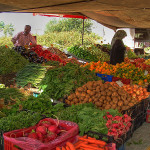
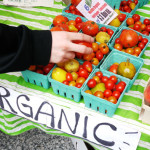
When we discuss where our vegetables and fruits come from it is best to understand how they are grown. But first, a quick scenario:
You walk into the grocery store, to the produce section. You look at the abundance before you, lettuce, broccoli, cabbage, apples, onions, carrots, beets, potatoes, and on and on. There is such a wealth of fruits and vegetables, yet, only 2% of all all North American agricultural land is used to grow these plants.
You wonder, “Where does it all come from?” It is so beautiful, so bountiful.
There is a sign for organic produce, all the rest is not labeled so.
Conventional Farming is the method of growing vegetables that uses:
chemical pesticides
herbicides and fertilizers
animal manures
genetically modified seed (sometimes) and hybrid seed
Farmers use heavy tractor machinery, including plows, cultivators and harvesters.
Ninety nine percent of all fruits and vegetables grown in North America are conventionally grown.
Organic farming is the method of growing vegetables that follows a series of organic guidelines, including the following:
approved organically prepared fertilizers
herbicides and pesticides (naturally occurring in origin)
organically approved use of compost and animal manures
non-genetically modified seed (non GMO)
Farmers may use heavy machinery although, the size and weight of the machinery is limited due to the scale of production.
Fewer than 1% of all fruits and vegetables grown in North America are organically grown.
But wait, you are vegan or want to become vegan, and as a vegan you want to make sure that absolutely no cruelty to animals exists in growing your food. You want to know if the plants you are eating are part of that 99.9% in North America that are grown utilizing fish, manure, blood, bones and/or feathers in the form of fertilizers?
Is there another option, you may ask. There is!
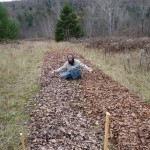
Veganic Farming, stock-free farming or plant-based farming, is a method of farming that uses plants to grow plants. When we feed the soil with plant-based materials, the plants are directly accessing the nutrients contained in said fertilizers. Other farmers feed the soil with manure, thus feeding the plants the excreted form of nutrients that have already passed through and been absorbed by the animal. Many nutrients are lost in the process, while at the same time subjecting other species, the earth and ourselves to many toxins and bacteria.
Veganic farming has actually been around for quite some time. When there were fewer than the current 7.5 billion people on the planet, there were also many fewer domesticated animals. Today there are 70 billion nonhuman animals worldwide “raised” yearly for human consumption. With less manure to use as fertilizer, farmers used methods of crop rotations , cover-cropping and direct plant-based sprays to preserve the character and fertility of the soil.
Legumes: Peas, beans, lentils and vetch build nitrogen into the soil.
Grain: Buckwheat builds potassium into the soil.
Herbs: Nettle is used as a Nitrogen spray fertilizer and comfrey is used as a potassium and phosphorous spray fertilizer.
Veganic gardeners also rely on mulch (straw, hay, leaf compost or chip-branch wood), plant-based compost and companion planting, both to encourage biological activity and to repel pests by bringing in beneficial insects. Veganic growers do not spray chemical pesticides (organic or not) as it will negate the work that the rotation systems and companion planting does to encourage bio-diversity.
Where can you find Veganic Produce?
Well… Since just like everything else, big industry has taken the cheapest and most profitable route in growing fruits and vegetables, veganic gardening is still infinitesimal. For instance, veganic produce is is not yet available in Montreal.
It is important to remember that you do have a voice when it comes to the cruelty subjected to animals, the alarming deterioration of our own health and that of the planet. Talk with your small, local organic farmer. Join a small scale CSA..
Remember we can all change the world, we just need to encourage each other along the way.
Biography:
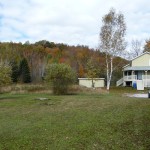

Jimmy is a veganic farmer who started farming in Arizona in 2005 as the owner and operator of a one acre organic mixed vegetable/ CSA farm. He also raised goats to make cheese from their milk and chickens for their eggs. The resulting manure was used as fertilizer and composting material.
In a 2010 move to Hawaii, Jimmy first experienced veganic farming while working on a farm that used plant compost and mango tree leaf litter soil to fertilize the crops. In his continued travels through 2011 and 2012, Jimmy worked on farms in Mexico, Belize, Costa Rica, Panama, Colombia and Ecuador, where due to a lack of availability of manures and conventional fertilizer, four of the seven were, by default, veganic. In 2012 Jimmy relocated to Quebec, Canada with his wife, Mélanie where he worked and volunteered on two relatively large scale ‘Eco-cert’ certified organic farms.
In October of 2013, Jimmy was introduced to the film, Cowspiracy- The Sustainability Secret” by co-director Kip Anderson, who is also a close friend. Jimmy corresponded with Kip every couple of days helping to fine-tune the movie and to share his insight as an organic farmer. This proved to be a seminal moment in his life, when he began to understand and appreciate the timely significance of veganism and veganic farming.
July of 2014 brought with it an offer to promote ‘Cowspiracy’ throughout Montreal and Quebec. At this time, Jimmy and Mélanie made the decision to take the 21-day Vegan Challenge. They both have remained plant based eaters and are shifting to a completely vegan lifestyle.
Jimmy believes that it is imperative to end nonhuman animal agriculture now, for the sake of all beings as well the earth on which we live. His mission is to demonstrate that veganic farming is not only possible, but also a highly productive model for the future of small-scale agriculture.
Jimmy and his wife currently reside in the small town of Boileau, just south of Mont-Tremblant where they are working to create 1 acre of veganic fields, starting in 2015.
You may connect with Jimmy on his Facebook page and at jimmyfarmer2012@yahoo.com
Annie’s Vegan View
May all beings be happy and free.


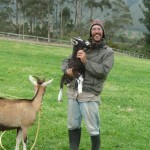
What a fascinating subject that makes absolute sense. I would not use animal based fertilizers to add nutrients to the soil in which my plants grow because I try /do not to use any animal based products ever; however, I never thought about it in the way you described. I will have to ask one of my favourite, local growers (Kind Organics) if they use veganic growing methods. Thank you for posting yet another informative piece. It was so interesting to read about Jimmy’s journey. It took time to fully comprehend and then internalize the information while making changes. This is how we become enlightened.
Hi Cindy,
Ooops!! I think that I was not clear in my intro. the article was written by Jimmy, not me. I have fixed up this boo-boo!!!
I am glad to hear that you are going to speak to your local grower. Dialoguing helps to initiate change.
Yes, Jimmy is living a very interesting and thoughtful life. I have met both he and his wife on several occasions and am impressed by their commitment to live according to their values.
Many thanks,
Anne
Thank you so much for sharing this! I’d never heard the term veganic farming, but the idea is something I’ve definitely put thought into over my vegan years. Sadly, I’d come to the conclusion that, like the food I feed the cats in my family, my own diet, although free of animal “products” was nevertheless not cruelty-free. And I’m not sure if there is even vegan farming in Germany. But, it’s really great to see what your friend Jimmy and his wife are doing! Thank goodness for folks like them! If only the public who doesn’t care about the suffering of farmed animals realized how much destruction to the planet and eventually the human race because of what we’re doing is going on, maybe they’d care then. Thanks for helping spread the word! 🙂
Hey Krissa,
I think that we all do our part in trying to spread the word. I too, think that what Jimmy and Melanie are doing is beyond fantastic, especially since that are new to veganism. Setting out intention every day to be part of bringing compassion back into the forefront is a worthy cause.
Many thanks,
Anne
How interesting! Always something new to learn. Thanks for sharing. 🙂
My pleasure!
Pingback:More about veganic farming – The Metal Hare's Mix
Hey Anne,
As you know I became vegan in April and shortly after that I started to make my allotment veganic. Previously I had used chicken manure pellets and blood and bone and I dread to think how I was funding that industry. Since going vegan I have used organic seaweed and comfrey as a fertiliser with brilliant results. I share my knowledge with other allotment holders and also the organic component.
Here in the U.K, hedgehogs are in trouble and nearly every allotment holder I know puts down slug pellets. These kill not only the hedgehogs but thrushes too and they are also in decline. There are many other ways to deter slugs such as copper tape and crushed seashells. I never use pesticides any more, but grow species of plant which will directly benefit the bees. On our last allotment open day I wrote a piece for the Hull Daily Mail about organic veganic gardening and it created a lot of interest. This year I won First prize twice in two shows for best courgette and also won the sweet pea cup trophy for best sweet peas. I wanted to show people that you could still get good produce from veganic gardening and these results backed up the theory, so to speak. Since then, I have had other allotment holders approach me as to methods I use to make my produce veganic. I have revelled in sharing my knowledge with them.
Jimmy and Melanie sound like amazing farmers. If I had more land I would love to follow in their footsteps.
Thank you for this informative article Anne.
Take care
Rachel
Hi Rachel,
I appreciate everything that you do to emulate and promote vegan living. It is very doable as I learned this summer when we purchased from Mélanie and Jimmy some veganic vegetable plants. We had peppers, kale, collard greens, parsley, basil…We will grow more next year.
Take care.
Anne